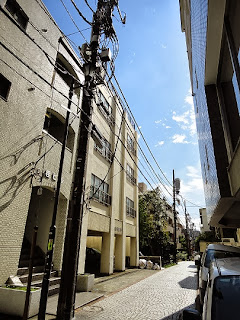みなさん、こんばんは!
(good evening, everyone!)
今日は、電信柱について書きます。
きょうは、でんしんばしら について かきます。
(I will write about a telegraph pole, today)
日本に、電線と電信柱がたくさんあります。
にほんに、でんせんと でんしんばしらが たくさん あります。
(In Japan, we have many telegraph poles and electric wire along streets.)
地下にあると、もっと景色がきれいかもしれないと思います。
ちかに あると、もっと けしきが きれいかもしれない とおもいます。
(I sometimes think if we had them underground, the scenery might be more beautiful.)
でも、電信柱に、時々メッセージがあります。
でも、でんしんばしらに ときどきめっせーじがあります。
(But telegraph poles sometimes hold a message.)
たとえば・・・。
(For example...)
大切ですね。
たいせつですね。
(Yes, it is important for everyone!)
他にも・・・。
ほかにも・・・。
(And also...)
 |
| (Be careful with cars!) |
子供向けに、ひらがなです。
こどもむけに、ひらがなです。
(It is written in Hiragana for kids.)
また、「猫を探しています!」とか、
また、「ねこを さがしています!」とか
(Also we have something like "I am looking for my cat!")
「この犬、知りませんか?」とかも見ます。
「このいぬ しりませんか?」とかも みます。
(and like "Has anyone seen my dog?”)
そして、私が最近見かけたのは・・・
そして、わたしが さいきん みかけたのは・・・
(The one I saw the other day is...)
 |
| lost property - glasses |
かわいい!!!
(Cute!!!)
誰かが、誰かのために、ビニールに入れてあげています。
だれかが、だれかのために、びにーるにいれてあげています。
(Someone put it in the plastic bag for the owner...)
電信柱のメッセージに、愛を感じます。
でんしんばしらの めっせーじに あいを かんじます。
(I feel people's love in the message on the telegraph poles)
電信柱が地上でも、悪くないかもしれません。
でんしんばしらが ちじょうでも わるくないかもしれません。
(Maybe it is not too bad to have telegraph pole on the ground.)
written by Ran
.jpg)
.jpg)
.jpg)
.jpg)
.jpg)
.jpg)

















